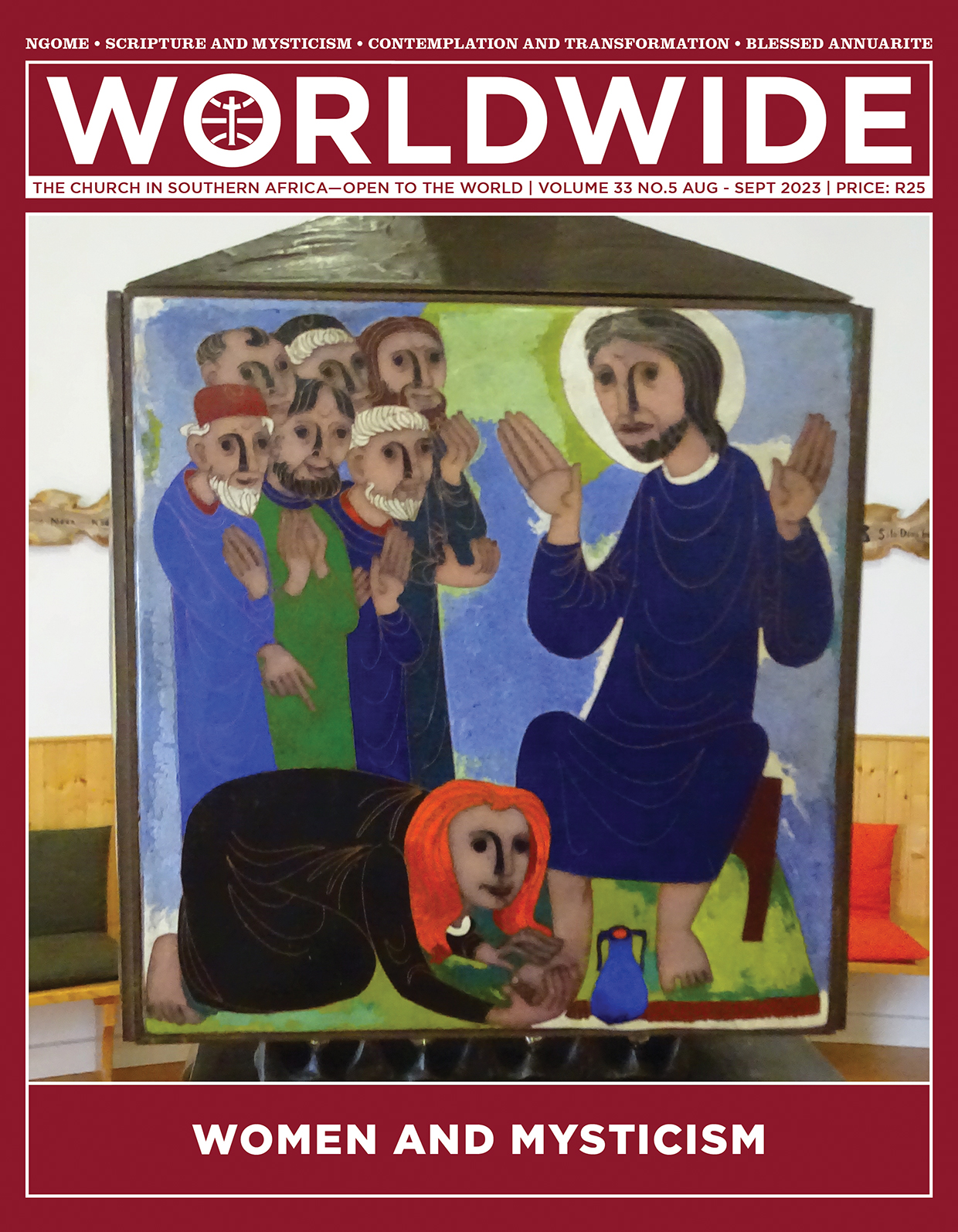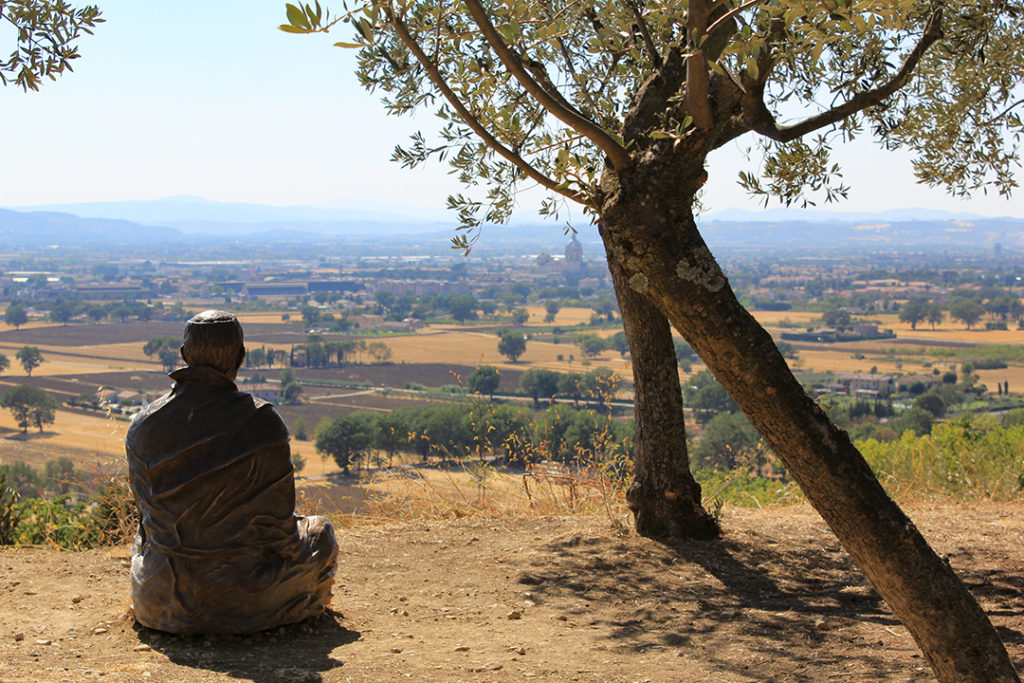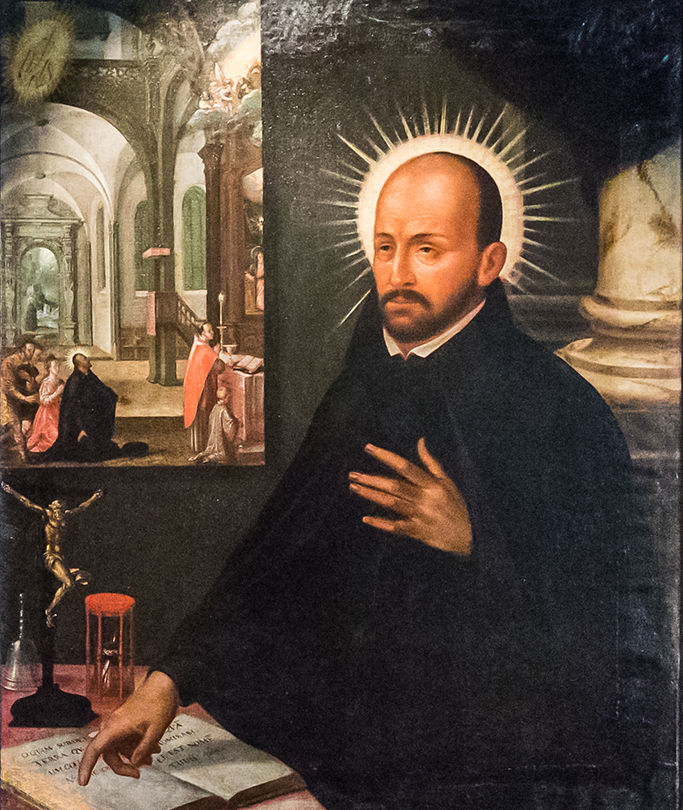
WOMEN AND MYSTICISM
Mary anoints Jesus’ feet at Bethany (John 12:1–8). The scene is part of a series which represents passages of women with a prominent role in the Scripture. The decorations are placed around the sides of the Tabernacle in the Chapel of Meditation at the University of Mystics in Avila, Spain.
Mary listens to and manifests her love for Jesus. Contemplation becomes the mesh in which her Spirit-led actions find their meaning and support.
REFLECTIONS • THE BETTER PART

Paths to Contemplation
The missionary of the third millennium must be a contemplative. Christian contemplation is always an encounter with a personal God revealed in the Bible and with Jesus, the way to the Father in the Holy Spirit. It is in contemplation that prayer becomes love
BY FR LORENZO CARRRARO MCCJ
St John Paul II, in his letter Redemptoris Missio (RM 90-91), affirms that the true missionary of the third Millennium needs to be a saint and he/she must also be a “contemplative in action”. “The missionary must find answers to problems in the light of God’s word and in personal and community prayer. My contact with representatives of the non-Christian spiritual traditions, particularly those of Asia, has confirmed to me the view that the future of mission depends to a great extent on contemplation. Unless the missionary is contemplative, he cannot proclaim Christ in a credible way. He is a witness to the experience of God, and must be able to say with the Apostle: ’that which we have looked upon … concerning the word of life … we proclaim also to you’ (1 Jn 1: 1-3),” affirms the pope (RM 91). Contemplation is experiential, therefore, something truly personal. Study can help and examples can foster contemplation, but only experience can make contemplatives of us.
A journey towards contemplation
Contemplation is a life-long commitment and, at the same time, a gift. We struggle to become contemplative as if it depended only on us but expect it in faith because we know that ultimately it is a gift from God. The mystery of God can be compared to a limitless horizon. The more we go up the more the horizon expands and the more we try to approach its borders the more they go far from us. Consequently, with the mystery of God, the more we enter into its knowledge the more we experience that it is inexhaustible. Only the pure of heart can see God: the simple, those with a limpid heart. If God is in front of us as a limitless horizon, our life appears as a continuous journey towards God. Purity of heart, as any other Christian virtue, is never a totally fulfilled perfection; if one thinks one has got it, one loses it and no longer can see God. One is deceived like the man in the Song of Songs who wanted to purchase love: “Were a man to offer all the wealth of his house to buy love, contempt is all he would purchase” (Song of Songs 8: 7).
Contemplation is a life-long commitment and, at the same time, a gift
To be a contemplative is a vocation for all of us who struggle for human and spiritual maturity. Contemplation is a gift and a conquest. Contemplation is something to be desired and experienced through different paths that bring us to intimacy with God, the Father, through Jesus, in the Holy Spirit.

Self-acceptance
The centre of the whole Christian message is the commandment of love: we were born to love. This is the meaning of our life: to reciprocate the love God has for us. What can however happen when we don’t love ourselves? Psychology has its specific contribution: it is possible to have a relationship of respect and reciprocity with other people only when we accept ourselves, respect ourselves, and love ourselves. The absence of self-acceptance and self esteem, especially when unconscious, can represent an obstacle to recognising and accepting God’s love for each one of us. Self-acceptance is a necessary condition for the journey to contemplation. Let our prayer be: “Lord, take me as I am and make me as you want me to be”.

Contemplation to gain love
The Ignatian way of becoming a contemplative is summed up in finding God in all things. At the end of his Spiritual Exercises, St Ignatius invites us to contemplation to gain divine love, which is a call to grow in contemplating God’s presence in all things. It is a vision of God’s immanent and loving presence in all realities so that we may always live “planted in love and built on love” (Eph 3:18). Let us recognise the degrees of God’s presence in everything that surrounds us and respond to these in love. First degree: God wishes to be present to us in His gifts. Therefore, let us not take anything for granted. Let our response be gratitude and thanksgiving. Second degree: God wishes to be present to us in the beauty and goodness of each gift. Let our response be reverence and sobriety. Third degree: God is at work in the heart of the world: “My Father goes on working and so do I”, says Jesus (Jn 5:17). Response: let us give our loyal service to the building of God’s kingdom. Praise, reverence and service to God: this is where love becomes contemplation.

Consecration
Our baptismal and religious consecration makes us God’s exclusive possession: “Set me as a seal on your heart, as a seal on your arm” (Song of Songs 8:6). Consecration will become contemplation when our love becomes tenderness: sensitivity, youthfulness, vulnerability, affection, benevolence, care, compassion and devotion. These are not simply human qualities but spiritual qualities: gifts of the Spirit, born of faith. Tenderness is also the fruit of compassion; virginity of the heart is also silence, loneliness and standing alone in faith. This happens when we become aware that what we have given up in our consecration will never be there: the unending poverty and the long loneliness; when we break down, we fall, we experience rebellion, fragility, the weight of evil and sin; when we experience the silence of God and the apparent uselessness of our efforts. To stand in front of God in naked faith is contemplation.

Contemplation and friendship
The Devotions to the Sacred Heart, to the Divine Mercy focuses the attention of our heart on the Blessed Humanity of Jesus as the sacrament of our salvation. This aspect was manifested throughout the centuries in innumerable forms in the arts. The Bridegroom’s chest signifies love and tenderness. It is the feminine, maternal side of God revealed in Jesus. To take shelter in the open Heart of Jesus is contemplation.
Jesus said: “I call you friends because I have made known to you everything I have learnt from my Father” (Jn 15:15). To experience Jesus’ friendship is contemplation. To see Jesus in the face of our friends is contemplation. To experience joy in wholesome friendship is contemplation. Really, the affectionate pursuit of contemplative prayer is a bounty and a refuge for every sensitive and mature follower of Jesus, the better part that will not be taken from us.

